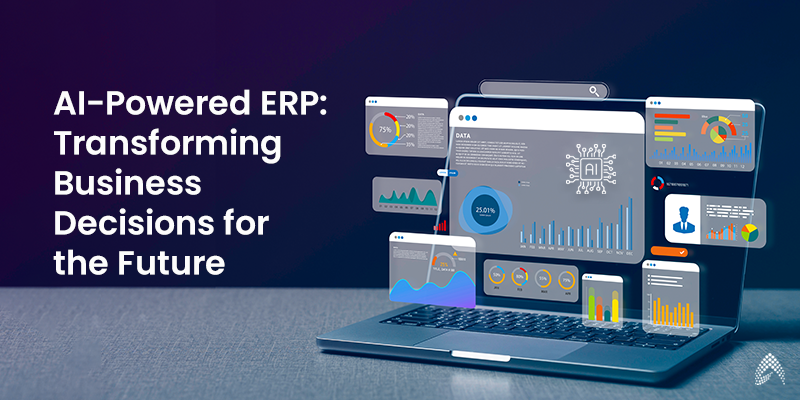AI-Powered ERP: Transforming Business Decisions for the Future

In an era defined by data-driven decision-making, businesses are increasingly turning to technology to gain a competitive edge. The Generative AI in ERP market size is expected to be worth around USD 853.4 million by 2033, growing at a compound annual growth rate (CAGR) of 25.5% during the forecast period from 2024 to 2033. This trend stems from the realization that while traditional ERP systems are essential, they often fall short in providing the real-time insights and predictive capabilities that modern businesses demand.
Imagine a world where your ERP system not only automates tasks but also anticipates your needs, optimizes your processes, and predicts future trends. This vision encapsulates the promise of AI-powered ERP, a transformative technology poised to revolutionize how businesses operate.
In this blog, we will explore the key features and benefits of AI-powered ERP, how it has the potential to revolutionize business decisions, and the challenges and considerations that come with its implementation.
Understanding AI-Powered ERP
Machine Learning
Natural Language Processing (NLP):
Predictive Analytics
Proactive Insights
Intelligent Automation
Real-time Decision Making
Personalized Experiences
Transforming Business Decisions
Enhanced Decision-Making
For example:
Optimized Inventory Management
Improved Supply Chain Efficiency
Financial Forecasting
Improved Efficiency and Productivity
For instance:
Streamlined Procurement
Optimized Production Planning
Accelerated Financial Closing
Enhanced Customer Experience
Personalized Recommendations
Improved Customer Support
Optimized Marketing Campaigns
Challenges and Considerations
Addressing the Challenges of AI-Powered ERP
Data Quality
Ethical Implications
Security
Organizational Readiness
Overcoming Challenges and Ensuring Success
Prioritize Data Quality
Strengthen Security
Foster a Data-Driven Culture
Start Small
Partner with Experts
Conclusion: AI-Powered ERP – A Catalyst for Transformation
AI-powered ERP represents not just a technological upgrade but a potential path toward transformative change in business operations. By exploring the possibilities of AI, companies can unlock hidden insights, revealing trends and patterns that enable smarter, data-driven decisions. This technology can optimize operations by streamlining processes, reducing costs, and enhancing efficiency, allowing resources to be redirected toward strategic initiatives. Additionally, tailored AI-driven insights could foster loyalty and support revenue growth by personalizing customer experiences.
While many organizations are still in the early stages of AI implementation, the potential benefits—greater efficiency, innovation, and competitive advantage—make it a worthwhile pursuit. At Amzur, we have been helping businesses with their ERP needs for over 20 years. Our team of experts is prepared to assist organizations in exploring tailored solutions to meet their unique requirements.
Ready to discover the possibilities of AI-powered ERP? Contact us today to schedule a consultation. Together, we can drive innovation, improve efficiency, and help you achieve your strategic goals.

Director – ERP Advisory & NetSuite Solutions




